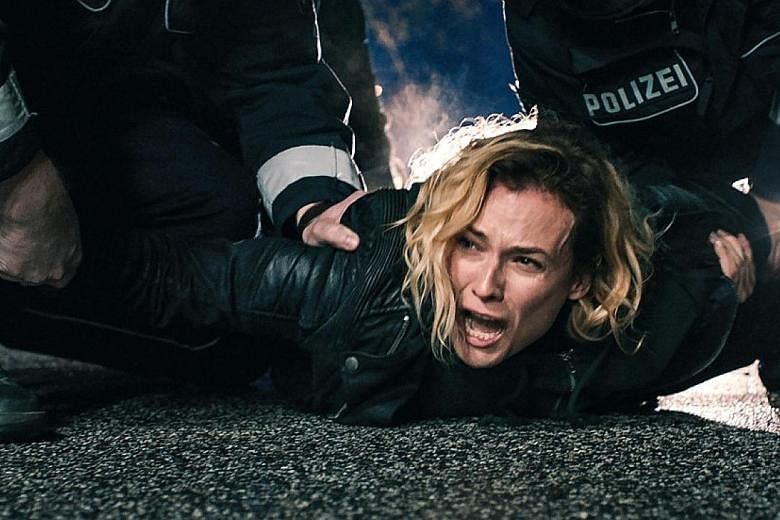BOSTON • Has Diane Kruger finally arrived? And what took her so long?
The 41-year-old won a best actress prize at last year's Cannes Film Festival for her role in In The Fade. In the movie, by German director Fatih Akin, her character's Turkish immigrant husband and their son are killed by neo-Nazis.
Fade is Kruger's first film in her native German language. As a young woman, she moved to France to study acting and now divides her time between Paris and New York.
But it also feels like the first meaty role for the model-turned-actress best known for the Brad Pitt sword-and-sandal epic Troy (2004), the National Treasure action franchise (2004, 2007) and Inglourious Basterds (2009).
While still basking in the glow of Fade's Golden Globes win for best foreign-language film, she spoke by phone on where she hopes she is headed.
This movie may come as something of a surprise to audiences, who are used to seeing you as a sidekick in National Treasure movies.
I'm not sure I would have been able to play this part five years ago.
When I started out, Troy was the second movie I ever made. I became a known actress overnight; I'm not sure I deserved all the attention.
Two things happened to make In The Fade happen: One, growing older; two, finding a director who is willing to bring you to something you weren't sure you even had.
Do you expect to see your career change, with all the buzz about the new movie?
Yes, word is out. But I don't have any expectations. If one performance can put the idea of casting you in front of a film-maker, that's great, but I don't want to be dependent on others.
That's why I'm producing my projects. I'm hoping that a mini-series I'm producing on Hedy Lamarr (American actress and inventor) will get off the ground, so we can go into production by the end of the year.
In Fade, is it fair to say that it flips the script, in that a Muslim immigrant is the victim, rather than perpetrator, of terrorism? (Her character) Katja's personal journey, which entails a kind of radicalisation, also is quite shocking.
The ending was always the hard part. Like you, when I first read it, I wasn't sure how I was going to get there, as an actor, how to make (Katja's transformation) believable.
As I was preparing for the role - meeting, over six months, with the victims of terrorism - I saw people beaten down by what happened to them, people who wished they could have taken revenge.
I finally came to a conclusion that this was Katja's way. I like that the movie leaves it open: You're wondering why she did what she did.
What does the final shot - of a world upside down - say to you?
I knew that the ending was going to be controversial. But it's a movie and subject to interpretation. My favourite shot is not that one, but the one where I walk towards the trailer (where the neo-Nazis are hiding) and I'm out of focus and I slowly come into focus.
This seems to me to be the central metaphor of the film, about Katja becoming clear about what she's about to do.
How was playing Katja more or less challenging than, say, the role of Sonya Cross, the detective with Asperger's syndrome you played on television series The Bridge?
This one required a vulnerability, a nakedness. It's the first time I played something that I myself am so afraid of. For the first time, I felt like the border between my personal life and work life was blurred. In The Bridge, when you play someone with a medical condition, that can be equally challenging.
There's a whole community that you don't want to offend. The danger is in mimicking tics or behavioural patterns.
When you say working on the movie blurred boundaries, are you referring to the recent deaths of your stepfather and grandmother, and break-up of your long-time relationship with actor Joshua Jackson?
Yes, that's part of it. But also just meeting people through my research. You get involved, on a personal level, with people's lives.
But, yes, my own personal loss, especially the death of my stepdad while we were filming.
I felt like I was drowning in grief.
The Golden Globes ceremony was a great night for women's voices and woman-centred stories. What do you make of the cultural shift we seem to be experiencing?
Fifty per cent of the world's population is female. I don't know when film became such a macho and male-driven industry.
We're everything that male people on this planet are: We're strong, we're weak, we're vulnerable, we're silly, we're stupid - but also smart.
I've had this Hedy Lamarr thing for four years.
Nobody wanted to make it. It's only in the past year that, all of a sudden, people are interested.
WASHINGTON POST

